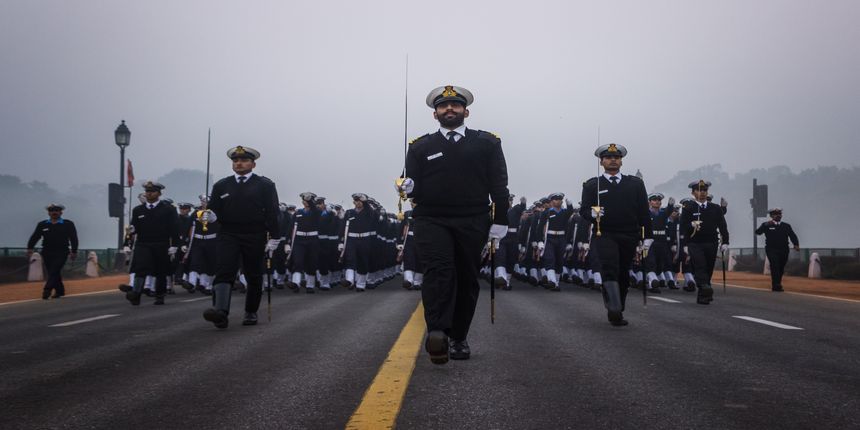JEE Main is a national level entrance test which is conducted twice a year by National Testing Agency. The exam is conducted online through computer based test mode. Candidates who qualify JEE Mains are eligible to appear for JEE Advanced exam. Apart from IITs and NITs, many other institutes use the scores of JEE Mains for conducting their admission process.
Indian Navy B.tech Entry scheme through JEE Main 2019 - Eligibility Criteria
Candidates applying for Indian Navy B.Tech Entry 2019 must first check the eligibility criteria as ineligible candidates will be disqualified from the selection process. Authorities have prescribed Indian Navy B.Tech eligibility criteria and candidates must go through the same carefully before filling the application form. Find the Indian Navy B.Tech entry eligibility criteria in detail below:
Criteria | Eligibility |
Educational Qualification | Candidate must have Passed Senior Secondary Examination (10+2 Pattern) or its equivalent examinations from a recognized Board with at least 70% aggregate marks in Physics, Chemistry and Mathematics (PCM) and at least 50% marks in English (either in Class X or Class XII).
|
Qualifying Examination | Candidates must have appeared for JEE (Main) 2019. Applicants will be shortlisted for Service Selection Board (SSB) interview on basis of JEE Main 2019 All India Rank. |
Physical Standards | Height and Weight: Height of the candidate must be atleast 157 cms with correlated weight as per age. Eye Sight: The minimum acceptable vision standards for distant vision is 6/6, 6/9 correctable to 6/6, 6/6 with glasses. Applicant should not be colour/night blind. Tattoo: Permanent body tattoos are not permitted on any part of the body, however, certain concessions are permitted to candidates belonging to tribal communities/from tribal areas as declared by the Government of India. For other candidates permanent body tattoos are only permitted on inner face of forearms i.e. from inside of elbow to wrist and on the reverse side of palm/back (dorsal) side of hand.
|
Age Limit | Candidate must be born between 02 Jul 2000 & 01 Jan 2003 (both dates inclusive) |
Indian Navy B.Tech Entry Scheme through JEE Main - Pay scale and allowances
The detailed pay scale and other allowances of Indian Navy B.Tech entry scheme are given below:
Rank | Pay Bands/Scale | Grade Pay | MSP |
Sub Lieutenant | PB-3/15600-39100 | 5400 | 6000 |
Lieutenant | PB-3/15600-39100 | 6100 | 6000 |
Lieutenant Cdr | PB-3/15600-39100 | 6600 | 6000 |
Commander | PB-4/37400-67000 | 8000 | 6000 |
Allowances (as applicable): The rates of allowances applicable to officers are as follows (being revised as per 7th CPC):
Allowances | To whom granted | Rate Per Month (in Rs) |
Technical | Technical Officers | 3000-7500/pm depending on courses qualified |
Instructional | All officers posted as instructor | 2700/pm |
Flying | Qualified Pilot/Observer | 13500 - 21000/pm |
MARCOs | Qualified as MARCOs | 13500 - 21000/pm |
Submarine | Qualified Submariner | 13500 - 21000/pm |
Diving | Qualified Ships Diver | 600/pm |
Sea Going
| All Naval Officers serving Onboard Ships (Sailing Only) | 6300-7800/pm on basis of Rank |
Uniform | All Officers | 24000 (Initial grant) & 7500 (Every 3 Yrs) |
Hard Area | All Officers posted in Hard Area as declared by Govt. | 25% of BP+GP+MSP |
House Rent | To Officers not provided Govt. Accommodation | 10-30% of Basic (Pay Band+Grade Pay+MSP) |
Transport | All Officers | 1600-3200 (+DA thereon) |
Cost to Company (CTC): The CTC for a sub Lieutenant would be approximately Rs. 72,444/- to Rs. 81,700/- per month. This breakup will include Basic Pay, Grade Pay, DA, House Rent and Military Service Pay.
Privileges: Apart from the CTC, Indian Navy will also provide selected candidates Free Medical Facilities for Self & dependents, Canteen Facilities, Entitled Ration, Mess/Club/Sports Facilities, Furnished Govt. Accommodation, Car/Housing Loan at subsidised rates.
Group Insurance & Gratuity: Indian navy will provide officers an insurance cover of Rs. 75 lakhs (on contribution) and gratuity as per the latest rules in force.
Leave Entitlements: Officers selected through Indian Navy B.Tech through JEE Main are entitled to 60 days annual and 20 days casual leave every year (subject to service exigencies). Leave during training period will be as per the Training Policy in force. Officers will also be entitled to 40% rail concession to any place and free travel (as per extant rules) for self and Dependents.
Sports & Adventure: Indian Navy will also provide facilities for various sports. In addition, one can also learn and participate in adventure sports, such as mountaineering, hot air ballooning, wind surfing, hand gliding etc.
Indian Navy B.Tech Entry Scheme through JEE Main 2019 - Training
The training of Indian Navy B.Tech 2019 is scheduled to start in Jan 2020. Applicants who will be recommended by the SSBs and passed the medically test, will be selected for training in Indian Naval Academy Ezhimala, Kerala based on All India Merit and on the number of vacancies. Authorities will score candidates on the basis of the SSB performance and on the basis of the same an All India Merit will be prepared. Candidates who will be selected in the SSB rounds will be inducted as Cadets for four year B. Tech course in applied Mechanical Engineering (for Engineering Branch including Naval Architect specialisation) or Electronics & Communication Engineering (for Electrical Branch), Electronics & Communication Engineering (for Executive Branch), as per Naval requirements. On successful conclusion of the 4 year degree course, B. Tech Degree will be awarded by Jawaharlal Nehru University (JNU).
Note: Indian Navy will bear the entire cost of training, including reading material and books. Cadets will also be entitled to free clothing and messing.

